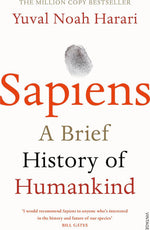- Home
- Sapiens: A Brief History of Humankind
Sapiens: A Brief History of Humankind
Couldn't load pickup availability
Summary
Sapiens: A Brief History of Humankind by Yuval Noah Harari is a sweeping exploration of the history of humanity, from the earliest days of Homo sapiens to the present. Harari examines how our species evolved, how we developed complex societies, and how our cognitive, agricultural, and scientific revolutions shaped the world. The book highlights key moments in history, such as the Cognitive Revolution, the Agricultural Revolution, and the Scientific Revolution, and discusses their far-reaching consequences. Harari also challenges traditional views about human history, offering insights into the ways in which culture, power, and technology have influenced the course of civilization. With a blend of history, anthropology, and philosophy, Sapiens provides a thought-provoking look at how Homo sapiens became the dominant species on Earth and the impact we’ve had on the planet.
Key Points from Sapiens: A Brief History of Humankind
-
The Cognitive Revolution
Harari argues that around 70,000 years ago, Homo sapiens underwent a Cognitive Revolution, which allowed us to develop complex language, abstract thinking, and shared myths. This cognitive leap enabled humans to collaborate in large groups, leading to the development of societies and cultures. -
The Agricultural Revolution
Around 10,000 years ago, the Agricultural Revolution drastically changed human societies. Instead of being nomadic hunters and gatherers, humans began to settle and farm. While this allowed populations to grow, Harari argues that it also led to the rise of inequality, disease, and a more rigid social structure. -
The Unification of Humankind
Over time, human societies began to merge and unify through trade, empires, and religions. Harari explores how the spread of ideas, beliefs, and systems of governance, such as empires and religions, helped create a more interconnected world, leading to global cooperation and conflict. -
The Scientific Revolution
The Scientific Revolution, which began around 500 years ago, radically transformed human societies by emphasizing the importance of observation, experimentation, and knowledge. Harari argues that science not only revolutionized technology and industry but also shifted humanity’s view of the world and our place in the universe. -
The Anthropocene and the Future of Humanity
Harari examines the current and future impact of Homo sapiens on the planet, discussing issues such as climate change, biotechnology, and artificial intelligence. He raises questions about the future of humanity, including whether we will continue to evolve biologically or whether we will merge with technology in new ways.







